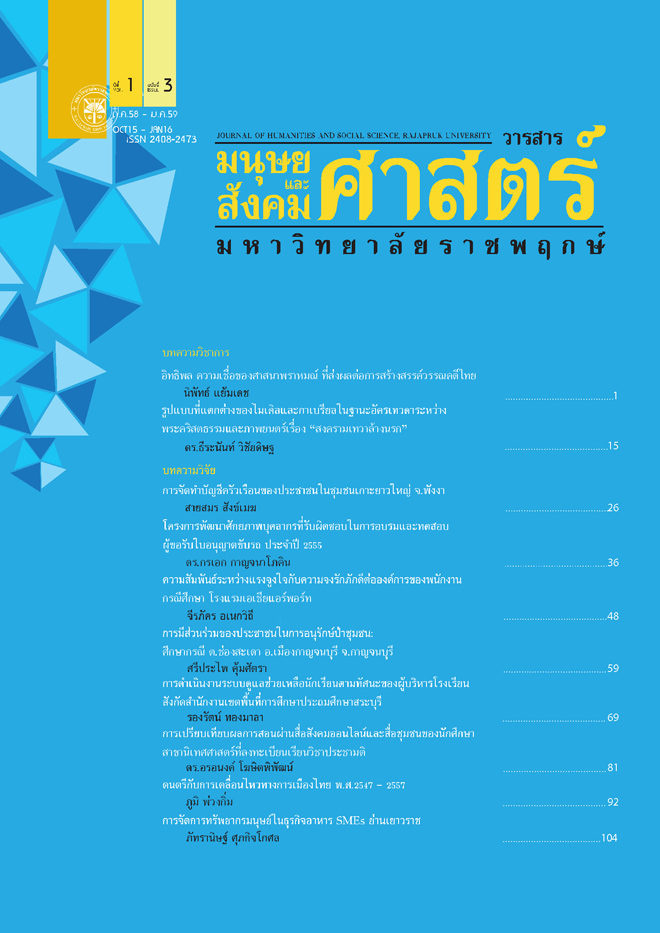Human Resource Management in Food Business SMEs Yaowarach Area
Main Article Content
Abstract
The objectives of this research were: to study and to compare the perception of the customers regarding Food Business SMEs Yaowarach Area, to study human resource management in Food Business Yaowarad Area and proposing the way of developing the human resource management of Food Business SMEs Yaowarach Area. The samples in this study consisted of 400 customers. The methods of this research were interview and questionnaires. The statistic measurements were Percentage, Mean, Standard Deviation, t-test, One-way ANOVA, and Least Significant Difference (LSD). The results of this research were as follows:
1) The perception of customers regarding overall service were rate at a high level in characteristic of food business employees, process, and services management quality. 2) The results of services comparison founded that the differences of sex, age, and career provides similar perception of the service; while the differences of income, expense, and frequency of using service provides different perception of the service with the significant of .05 3) Human resource management of entrepreneurs regarding recruitment from both outside and inside was not too complicated. The training programs were provided. The compensation complies with the government’s declaration of minimum wage. The safety management for the employees and Using on the job training by the current employees. 4) The way of developing the human resource management of Food Business. The entrepreneurs must have knowledge about resource management processes. Each qualifying position as a system. And a set of evaluation criteria in clear transparent.
Article Details
References
ชำนาญ ภู่เอี่ยม. (2548). การบริการ. กรุงเทพฯ: เทศาภิบาล.
ชูชัย สมิทธิไกร. (2550). การสรรหา การคัดเลือก และการประเมินผลการปฏิบัติงานของบุคลากร. พิมพ์ครั้งที่ 2. กรุงเทพฯ: สานักพิมพ์แห่งจุฬาลงกรณ์มหาวิทยาลัย.
นิโลบล เหล่าเกษมสุขวงศ์. (2555). คุณภาพการบริหารของร้านอาหารสหโภชน์แห่งมหาวิทยาลัยเกษตรศาสตร์. ปริญญาวิทยาศาสตรมหาบัณฑิต (การจัดการเทคโนโลยีอุตสาหกรรมเกษตร) สาขาการจัดการเทคโนโลยีอุตสาหกรรมเกษตร ภาควิชาเทคโนโลยีอุตสาหกรรมเกษตร มหาวิทยาลัยเกษตรศาสตร์.
ปิยพรรณ กลั่นกลิ่น. (2549). อาหารเครื่องดื่มและการบริการในภัตตาคาร. กรุงเทพฯ: โอเดียนสโตร์.
พรภัทรา แตงอ่อน. (2550). การพัฒนาตนเองของพนักงานบริการในธุรกิจร้านอาหารศึกษาเฉพาะกรณี บริษัท มัลลิการ์ อินเตอร์ฟู๊ด จากัด. บัณฑิตวิทยาลัย สาขาการจัดการทรัพยากรมนุษย์ มหาวิทยาลัยราชภัฎสวนดุสิต.
วิชัย โถสุวรรณจินดา. (2556). การบริหารทรัพยากรมนุษย์. (พิมพ์ครั้งที่ 4). กรุงเทพฯ: โฟร์เพซ.
Kotler, Philip. (2000). Marketing Management Analysis Planning Implementation and Control. (10th ed). New Jersey: Prentice-Hall, Inc.
Lovelock, Cristopher H. (1996). Service Marketing. Englewood Cliffs. New Jersey : Prentice-Hall. P. 464-465.
Maslow, Abraham. (1970). Motivation and Personality. New York: Harper and Row.
Nadler, L. and Nadler, Z. (1990). The Handbook of Human Resource. 2nded. Toronto: John Wiley & Sons.
Peter, Straube. (1997). Why Customer Satisfaction May Not Mean Loyalty. Nation’s Restaurant News. Vol.31 No.30. [Online] Available :
http://www.thailis.uni.net.th/abi/detail.nsp.
Soriano, D.R. (2008). Difference ways of Measuring Performance in the Service industries: Application in Spanish small and Medium-sized hotel. The Service Industries Journal. 28, 27-36.


